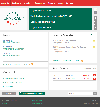For many countries, feeding the population is the most important task of the state. In Brazil, Southeast Asia and China, the agricultural sector not only provides employment but also contributes significantly towards the country´┐Żs GDP.
It is important to involve experts with knowledge of the local language, culture and traditions. Uralkali combines this principle with the best international practices and agronomy expertise, inviting foreign professionals and world-class experts to participate in our workshops.
Outreach programmes
Farmers and other representatives of the agricultural sector in emerging countries have the opportunity to attend workshops, seminars and other educational events held by the Company. Uralkali organises numerous outreach events informing our target audiences of the positive sides and profitability of the use of potash fertilisers as well as of the cutting-edge technologies of fertiliser use.
The Company implements educational projects in Russia and in the emerging countries of Asia, Africa and Latin America. Uralkali promotes the idea of balanced plant nutrition and encourages the use of muriate of potash (MOP) and potash fertilises in agriculture.
VietnamFor Uralkali, Vietnam is an important market with a lot of potential for growth. Over the past 8 years, the Company has been putting a lot of effort into the promotion of potash fertilisers in collaboration with industry partners and the leading Vietnamese scientific organisations. This involved training farmers in various regions of the country in cutting-edge practices of potash application and demonstrating the positive results of the application of optimised potash nutrition schemes. Within the framework of the agricultural projects in Vietnam, a number of experiments with a balanced use of potash fertilisers has been conducted on crops, such as oranges, lychee fruit, black pepper, bananas, rice, corn, watermelon, coffee, dragon fruit, cassava, and custard apple. The results of the field trials clearly showed the high agricultural and economic efficiency of balanced potash fertilisation to local crop growers. For example, the application of potash in optimal dosages in orange farming not only resulted in higher yields, but helped to reduce the number of fruits falling off trees, to increase the sugar content and the size of the fruits, and to improve the organoleptic indicators. |
IndiaSince 2018, in cooperation with a regional partner, Uralkali has been implementing a pilot project on the efficient and balanced use of mineral fertilisers. Demonstration fields of maize, sugarcane and potatoes were planted in Uttar Pradesh to show farmers the benefits of balanced mineral fertiliser application in comparison with existing farming practices, in which plants often lack potassium. In all cases, balanced application of fertiliser demonstrated the maximum yield and the optimum cultivation economy. The project was accompanied by educational workshops for farmers, including visits to demonstration sites where participants could see the efficiency of the optimised nutritional plan. |
IndonesiaUralkali´┐Żs agronomic projects in Indonesia in Prior to this, in partnership with the International Plant Nutrition Institute (IPNI) and the non-profit organisation Cocoa Care, Uralkali specialists carried out large-scale trials assessing the efficiency of potash nutrition for cocoa beans to determine the most efficient cultivation technology. Trial participants were made up of more than 40 farmers specialising in the cocoa cultivation. Farmers received specialised advice on agricultural technologies and balanced plant nutrition, resulting in more than a twofold increase in the yield of cocoa beans. |
ArgentinaArgentinian soil is naturally rich in potassium, but agricultural intensification results in lower soil nutrition. In 2018-2019, Uralkali, in cooperation with a regional partner, Argentinian non-profit organisation Fertilizar, and the National Agricultural Technology Institute INTA, delivered a project to update potash map of soils in the Pampas region. The project revealed a significant reduction in available potassium in soil, and an imminent potassium deficiency in certain areas of Argentina. The first potash workshop drew the attention of the local agricultural community to the potential development of potassium deficiency in Argentinian soil. In 2019, long-term field trials were started in order to study the reaction of the key crops of the region (soybean, corn, rice and wheat) to potash nutrition. The latest results of this research show that the application of MOP helps to increase the yields and to improve the quality of the indicated crops. |


